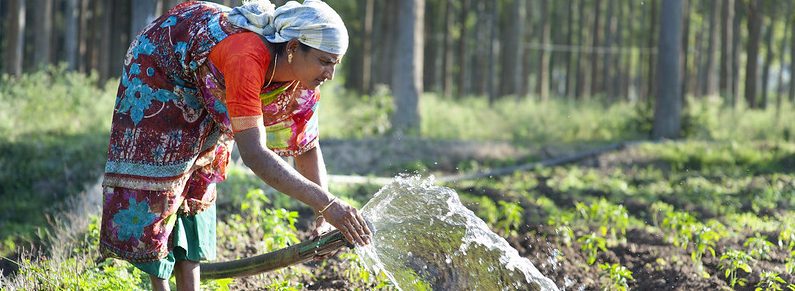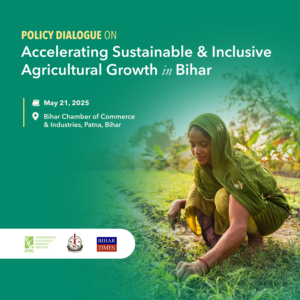PROGRAM AGENDA
About the policy dialogue
The International Food Policy Research Institute (IFPRI) in collaboration with the Bihar Chamber of Commerce & Industries (BCCI), and the BiharTimes Development Foundation, convened a high-level Policy Dialogue on “Accelerating Sustainable and Inclusive Agricultural Growth in Bihar” in Patna on May 21, 2025. The event brought together senior policymakers, economists, researchers, entrepreneurs, and representatives from Farmer Producer Organizations (FPOs) to deliberate strategies for driving agricultural transformation and rural development in one of India’s most agrarian states.
The event was graced by the Hon’ble Deputy Chief Minister of Bihar, Shri Vijay Kumar Sinha, who reaffirmed the state’s strong commitment to modernizing agriculture and supporting smallholder livelihoods through innovation and investment.
“Bihar’s future lies in the modernization of agriculture, the empowerment of farmers, and in crafting policies that respond to the realities of every farmer in every village. This dialogue marks an important step in aligning innovation, investment, and inclusive growth for lasting rural prosperity,” he stated.
Bihar at Crossroads: Need for Innovation and Policy Integration
Bihar, where over 77% of the population depends on agriculture as a means of livelihood, has made commendable strides in increasing food grain production and expanding its horticulture, livestock, and fisheries sectors. However, persistent challenges such as low crop productivity, limited mechanization, fragmented markets, and the impacts of climate change continue to hinder the sector’s potential. The dialogue highlighted the need for data-driven, inclusive, and climate-resilient policies to unlock agricultural value chains and enhance income generation, especially for women and smallholders.
Speakers emphasized that strategic integration of innovation, infrastructure, and institutional support is essential to move the state’s agriculture from subsistence to surplus and sustainability. With the state implementing its 4th Agriculture Roadmap (2023–2028), this dialogue provided an opportunity to take stock of existing programs and explore synergies across government departments, research institutions, and civil society.
Key Themes and Discussions
The day-long event featured four thematic sessions, each addressing a critical pillar of agricultural growth and transformation:
1. From Subsistence to Commercial Farming
This session explored the role of precision agriculture, digital technologies, and farm-level innovation in transitioning Bihar’s agriculture toward higher productivity and market orientation.
2. Impact of Climate Change on Agriculture
Panelists examined how climate variability affects crop productivity and rural livelihoods, and discussed adaptation strategies including water-smart practices, resilient crop varieties, and risk mitigation tools.
3. Organic Farming and Agro-Ecological Transitions
With increasing demand for organic produce, experts highlighted Bihar’s potential to emerge as a leader in sustainable and chemical-free agriculture through supportive certification systems, training, and institutional buy-in.
4. Market Linkages and Agribusiness Opportunities
Emphasis was placed on creating structured markets, strengthening FPOs, and leveraging public-private partnerships to scale up value chains and improve farmgate prices.
Institutional Collaboration and Evidence-Based Solutions
The event also marked a significant step forward in operationalizing IFPRI’s recently signed Memorandum of Understanding (MoU) with the Government of Bihar. Through this dialogue, IFPRI and its partners aimed to identify key research and development priorities to support the implementation of Bihar’s agricultural roadmap. The discussions reinforced the need to align public investments with scientific evidence, grassroots insights, and innovative delivery mechanisms. As a knowledge partner, IFPRI reaffirmed its commitment to generating actionable policy insights, supporting capacity building, and strengthening data systems in Bihar.


